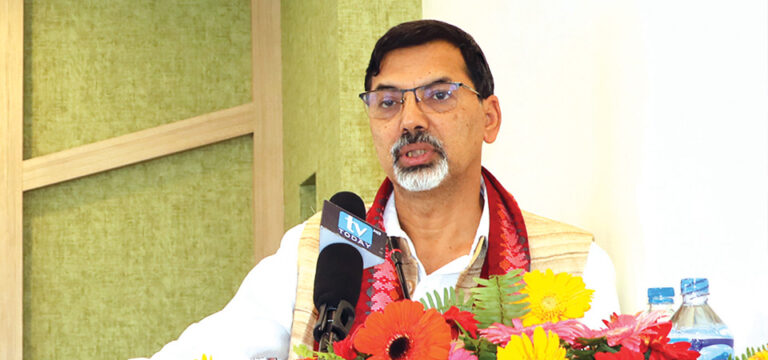
Finance Minister Janardan Sharma has said that he and Prime Minister Sher Bahadur Deuba are worried over the inability to increase capital expenditure.
Inaugurating the Lekhnath Festival organised by the Lekhnath Chamber of Commerce and Industry in Kaski on Thursday, Finance Minister Sharma said that only 19.15 per cent of the capital expenditure had been incurred to date of the current fiscal year and that he was pressuring all development ministries to increase the expenditure.
“The Prime Minister and I are worried that the capital expenditure has not met the target,” he said. “We held discussions on Wednesday to put pressure to increase the expenditure as per the budget target and programme. Again, I will continue to point out through various means.”
He said that the failure to meet the development expenditure target has affected the liquidity. “It seems that Rs. 30 billion needs to come to the market to solve the current liquidity problem. A few days ago, Rs. 11 billion came, but this is not enough to solve the problem,” he said.
He also said that continuous dialogue has been initiated with Prime Minister Deuba to solve the problems seen in the economy.
Recalling that there was no significant progress in capital expenditure last year as well, he said, “As of mid-February last year, 17.86 per cent capital expenditure had been incurred.” Despite the delay in the implementation of the budget by bringing the replacement bill on September 10 last year, the capital expenditure has been only one per cent less than last year, at 16.08 per cent,” he said.
Economy is not as depressing as rumored outside
Minister Sharma has said that the economy is not in a depressing condition as rumored outside. He said that the economy was under the control of the government and the problem seen would be resolved soon.
In the first six months of the last fiscal year, the inflation rate was at 3.56 per cent. The continuous rise in prices of petroleum products, edible oil, plastic, steel and steel products in the international market since the beginning of the current fiscal year has had an impact on Nepal.
However, in the mid-term review of the current fiscal year, the inflation rate remained at 5.03 per cent and remained within the targeted limit, he said.
“Prices of petroleum products have gone up by 100 per cent in the international market, edible oil by 70 per cent and plastic and steels by 50-60 per cent as compared to last year,” he said. With the increase in the amount to be paid, there is pressure on the balance of payments. However, we are trying to reduce the current balance of payments deficit by adopting a policy of tightening imports.”
He said that the government has started regulating the hundi business to solve the problem of declining remittances and is working in coordination with the police, revenue investigation department and asset laundering department after holding discussions with the Prime Minister to curb illegal economic activities, including crypto currency, digital networking and hyper fund.
Source : TRN,






